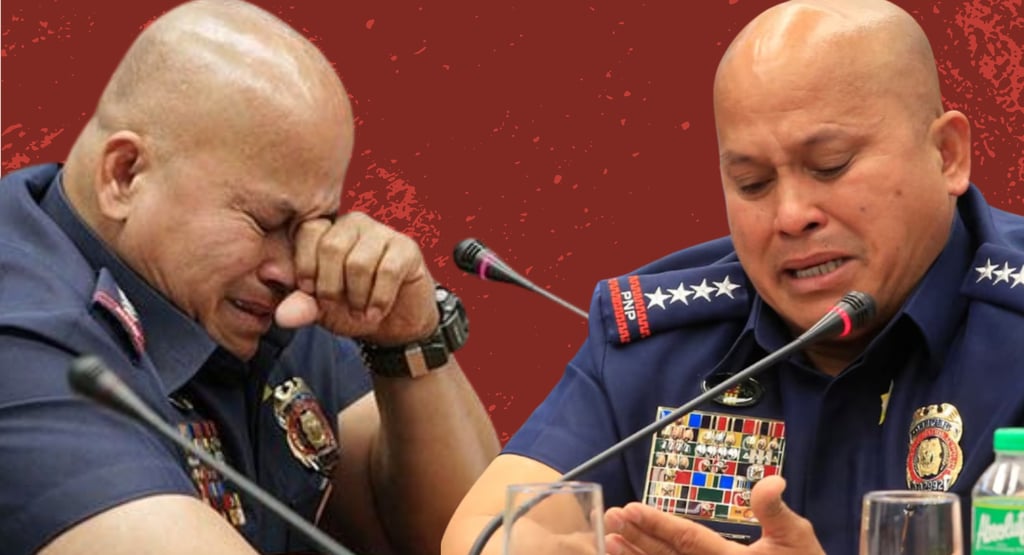When the Tough Guy Cries: Bato dela Rosa's Cycle of Courage and Cowardice
Senator Bato dela Rosa built his public image on strength and fearlessness. Now, as the ICC considers an arrest warrant over his role in the drug war, that image faces its biggest test. This blog examines the tension between his tough-guy persona and his response to looming accountability.
7 min read


I’ve been sitting here with my second cup of coffee while monitoring Typhoon Uwan (international name, Fung-wong), at the same time thinking about Senator Ronald “Bato” dela Rosa and the spectacle we’ve all been watching unfold. News about the International Criminal Court issuing an arrest warrant against him changed everything.
There’s something deeply ironic about watching a man who built his entire persona on being tough, fearless, and unbreakable now scrambling for protection behind Senate walls while claiming he’s not afraid.
Bato dela Rosa built his image on strength and command. A former military officer and Philippine National Police chief, he led a drug war that left thousands dead and often described himself as a soldier ready to face whatever came.
That’s where the contradiction becomes impossible to ignore and that’s what this piece will talk about.
The Weeping Warrior
Bato has cried in the Senate more than once.
He wept during hearings when he was still PNP chief, overwhelmed by questions about the drug war.
He cried when Senate President Zubiri was ousted, saying he felt like he’d failed to win the fight for his ally—even though he’d already signed the resolution supporting Zubiri’s replacement.
He also turned emotional last September during a privilege speech about Duterte’s detention at The Hague.
Again, there’s nothing wrong with men crying.
Emotional vulnerability is part of being human. What’s toxic is the belief that men must remain stoic—that “lalaki ka, hindi ka dapat umiiyak.” Men have every right to express grief, fear, frustration, and pain without being shamed.
The issue isn’t that Bato shows emotion. It’s the sharp contrast between the image he built and how he acts when accountability gets close.
This is a man who built his public identity on a specific kind of toughness—the unbreakable soldier, the loyal officer who doesn’t flinch, the cop who follows orders and faces any consequence. He chose that image. He built it. He benefits from it politically. Filipino culture has long celebrated the “action star” type—the man who solves problems through force and never bends. Bato has leaned on that archetype his entire career.
So when someone who has spent years telling us he’s fearless suddenly shows tears only when his own safety or reputation is at risk, it raises a fair question: are those emotions genuine, or part of the act?
The pattern is hard to ignore. His tears come when he is under pressure, when his loyalty is doubted, when his freedom feels uncertain. He cries while explaining why he supported removing Zubiri. He cries when defending Duterte. But he never showed the same emotion for the mothers who lost sons, or the children left orphaned by the operations he led. His tears always seem to circle back to himself.
It isn’t a question of whether men should cry. It’s a question of truth. Bato built a career on being Bato—the rock, the man who never breaks. Yet when emotions surface only at convenient moments, that strength starts to look like a costume.
If he had spent his career encouraging openness among men—showing that vulnerability could exist alongside strength—his crying would fit the values he stands for. But he hasn’t. He’s spent years being the unbreakable one. The contradiction isn’t that he cries; it’s that his tears never seem to reach those who suffered under his command.
The Flip-Flopping Strongman
When news about the ICC warrant broke, Bato initially spoke with bravado. He said he wasn’t afraid, that he wouldn’t hide, that he was ready to face whatever came. “I’m not bothered by the ICC,” he declared.
Strong words from a man who often spoke about courage and conviction.
But that confidence didn’t last long. He later admitted wearing a cap, mask, and jacket while traveling in Bicol so he wouldn’t be recognized. A sweet potato vendor still spotted him, and he ended up buying kamote to keep the vendor quiet. Imagine that—the country’s former police chief, the man who oversaw a bloody campaign, trying to disappear behind a mask and a bag of root crops.
He’s talked about finding “diskarte,” about staying in cities rather than the mountains, even hinting at taking shelter in Quiboloy’s compound. He said that if they caught him, they caught him, but he’d make it hard for them. “I have to survive,” he said.
Those words reveal a different kind of man—one who’s no longer unbothered, no longer fearless, and certainly no longer ready to face anything.
The Senate as Sanctuary
The Senate has now become his refuge.
Senate President Vicente Sotto III said that no senator can be arrested within the Senate premises, citing institutional dignity and courtesy. This isn’t new. The same protection was extended to Antonio Trillanes in 2018, when Duterte voided his amnesty and ordered his arrest.
And here’s the irony: back then, Bato was part of the camp that went after Trillanes. Now, he’s in the same position—shielded by the same courtesy he once dismissed.
The Constitution protects lawmakers from arrest only for offenses punishable by six years or less. Crimes against humanity don’t fall under that category. What keeps Bato safe isn’t law—it’s privilege. The Senate shields its own, and he’s counting on that wall to hold.
What Courage Really Looks Like
I keep thinking about Ninoy Aquino.
In 1983, Ninoy knew it was dangerous to return home. He had been warned not to, told that his life would be at risk. His family begged him to stay abroad, but he came back because he believed in something greater than his own safety.
He once said, “I have carefully weighed the virtues and the faults of the Filipino, and I have come to the conclusion that he is worth dying for.”
In the undelivered speech found on his body after his assassination, Ninoy wrote: “I have returned on my free will to join the ranks of those struggling to restore our rights and freedoms through nonviolence. I am prepared for the worst and have decided against the advice of my mother, my spiritual adviser, and my friends. I return from exile and to an uncertain future with only determination and faith in our people and in God.”
He stepped off that plane knowing what could happen. And it did.
I’m not saying Bato should martyr himself, but the difference between the two men is striking. Ninoy faced persecution with conviction; Bato faces legal accountability with hesitation. One met danger head-on for his beliefs, while the other avoids a courtroom that could question his.
If Bato truly believes he did nothing wrong, then he should face it. If he thinks the drug war was just, if he believes he followed lawful orders, then say so before the world. A man who’s certain of his innocence doesn’t hide behind Senate walls.
Ninoy could have stayed abroad in safety. He had comfort, opportunity, and freedom. But conscience brought him back. Bato says he’s ready for anything, yet his actions tell another story.
Hypocrisy and Power
The story goes beyond Bato—it mirrors how power works in this country. Those who speak the loudest about strength are often the first to hide when accountability closes in. They demand justice for others but shield themselves from the same standard.
Bato’s tears, disguises, and appeals for institutional courtesy are symptoms of a larger socio-political illness—an arrangement where institutions bend to protect those in power. It shows how accountability in the Philippines often depends not on guilt or innocence, but on status, loyalty, and political ties. The system itself becomes selective, punishing the weak while sparing the influential.
The same walls that now protect Bato have never existed for ordinary Filipinos. The poor who died in the drug war had no lawyers, no senators guarding them, and no gates to keep them safe. Yet the man who led that war now hides behind the very privileges denied to those who perished under his command.
Corruption isn’t always about stolen money. Sometimes, it’s the mindset that accountability applies only to the powerless.
Face It Like the Soldier You Claim to Be
So here’s the challenge.
If Bato truly believes in his innocence, he should face the ICC. A soldier doesn’t run from battle. He meets it head-on.
If he believes he only followed orders, then he should stand by them and present his defense. Stop talking about disguises, hiding places, and Senate courtesy. Stop crying only when comfort is threatened.
Courage doesn’t need to be performed. It doesn’t need to be announced. It doesn’t need protection from the very institutions he once used to pursue others. Real courage is quiet. It faces what comes.
Ninoy once said, “I could have opted to seek political asylum in America, but I feel it is my duty to suffer with my people especially in time of crisis.” Those words still echo through generations.
The question now is simple: will Bato dela Rosa face what’s coming with the courage he’s always talked about—or keep playing strong while running from the fight?
We’ll all be watching, coffee in hand.
SOURCES:
Philstar - Bato flip-flopping? Lawmakers puzzled
https://www.philstar.com/headlines/2025/03/20/2248380/bato-flip-flopping-lawmakers-puzzledYouTube - ICC issues arrest warrant vs Bato Dela Rosa, Remulla confirms
https://www.youtube.com/watch?v=fg1VmhSL5ZUInquirer - Bato: No more tears in Senate hearings
https://newsinfo.inquirer.net/1138897/bato-no-more-tears-in-senate-hearingsGMA Network - Sotto on reported ICC warrant vs. Bato: Senators won't be arrested
https://www.gmanetwork.com/news/topstories/nation/888008/sotto-on-reported-icc-warrant-vs-bato-senators-won-t-be-arrested/story/Philstar - Remulla says ICC warrant vs Bato out; DOJ verifying
https://www.philstar.com/headlines/2025/11/08/2319821/remulla-says-icc-warrant-vs-bato-out-doj-verifyingPolitiko - Bato in disguise? Dela Rosa’s disguise attempt fails
https://politiko.com.ph/bato-in-disguise-dela-rosas-disguise-attempt-fails/Philstar - Bato denies hiding, ready to join Duterte
https://www.philstar.com/headlines/2025/03/09/2246966/bato-denies-hiding-ready-join-duterteGMA Network - Bato on evading ICC arrest: 'I have to survive'
https://www.gmanetwork.com/news/topstories/nation/878160/bato-on-evading-icc-arrest-i-have-to-survive/story/Globalnation Inquirer - Dela Rosa admits attempt to disguise himself failed
https://globalnation.inquirer.net/226692/dela-rosa-admits-attempt-to-disguise-himself-failedPhilstar - Sotto: Arrests off-limits at Senate, but outside no longer our
https://www.philstar.com/headlines/2025/11/08/2319824/sotto-arrests-off-limits-senate-outside-no-longer-ourCNN - Philippines senator Antonio Trillanes arrested after weeks holed up
https://www.cnn.com/2018/09/25/asia/philippines-trillanes-arrest-intl/index.htmlOCCRP - Duterte Orders Arrest of Senator Accusing Him of Graft
https://www.occrp.org/en/daily/8779-duterte-orders-arrest-of-senator-accusing-him-of-graftAl Jazeera - Philippines' Duterte orders arrest of opposition senator
https://www.aljazeera.com/news/2018/9/4/philippines-duterte-orders-arrest-of-opposition-senatorWikipedia - Ninoy Aquino
https://en.wikipedia.org/wiki/Ninoy_AquinoPCIJ - The undelivered speech of Sen. Benigno Aquino Jr. upon arrival at MIA, Aug. 21, 1983
https://pcij.org/article/5300/ninoy-the-undelivered-speechRamildizon Wordpress - Ninoy Aquino Quotes | Are we still worth dying for?
https://ramildizon.wordpress.com/2014/08/20/ninoy-aquino-quotes-are-we-still-worth-dying-for/You.com PH - In Ninoy’s Own Words
https://www.you.com.ph/stories/2020/08/22/in-ninoys-own-wordsExaminer HK - Is the Filipino worth dying for?
https://www.examiner.org.hk/2022/04/28/is-the-filipino-worth-dying-for/Wikipedia - Assassination of Ninoy Aquino
https://en.wikipedia.org/wiki/Assassination_of_Ninoy_AquinoEsquire PH - Masculinity and Men's Mental Health
https://www.esquiremag.ph/long-read/essay/masculinity-and-men-s-mental-health-a2104-20250614-lfrmRepublic Asia Media - Fantasy of the Tough Guy: Why Filipinos Elect Action Stars
https://republicasiamedia.com/fantasy-of-the-tough-guy-why-filipinos-elect-action-stars/Philstar Life - Dela Rosa’s camp issues statement amid alleged ICC warrant
https://philstarlife.com/news-and-views/432946-dela-rosa-camp-statement-icc-warrantGMA Network - Weeping Bato dela Rosa turns out voting for Escudero as Senate President
https://www.gmanetwork.com/news/topstories/nation/874250/weeping-bato-dela-rosa-turns-out-voting-for-escudero-as-senate-president/story/
Contact us
subscribe to morning coffee thoughts today!
inquiry@morningcoffeethoughts.org
© 2024. All rights reserved.
If Morning Coffee Thoughts adds value to your day, you can support it with a monthly subscription.
You can also send your donation via Gcash: 0969 314 4839.
